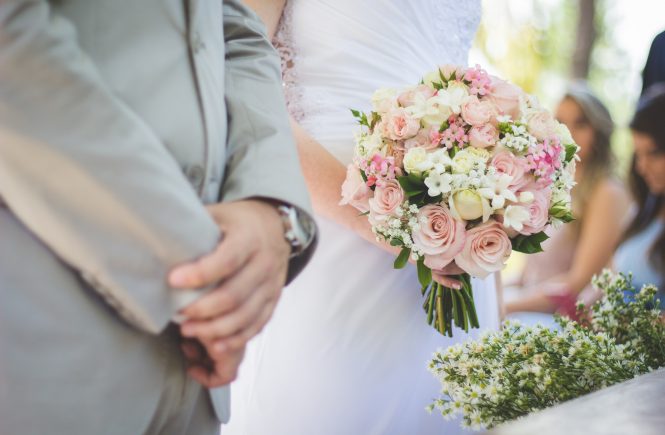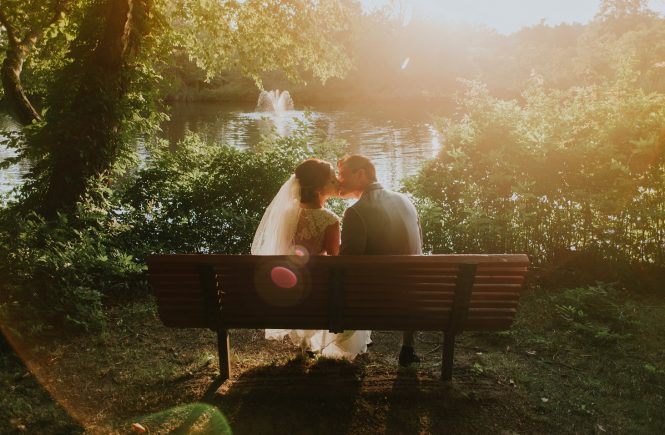Are you looking for a career path that will give you emotional fulfilment and joy? Then being a marriage celebrant may just be the right career for you! As a celebrant, your work is to help your clients have the best day of their lives and share their love with their family and friends.
In recent years in Australia and around the world, there has been a huge shift away from traditional church ceremonies to civil ceremonies that provide a more modern and flexible approach. This is great if you’re planning on becoming a professional celebrant as you know the industry is in demand!
There are thousands of registered celebrants in Australia so competition is tough, but if you’re dedicated, work hard and bring something special to your clients that other celebrants don’t offer, you can build a wonderful reputation for yourself.
What does a celebrant do?
A Civil Marriage Celebrant is someone who is appointed by the Australian Government’s Attorney-General’s Department as authorised to solemnise and legalise marriages anywhere in Australia. This is in accordance with the Marriage Act of 1961.
Marriage celebrants are legally required to undertake ongoing professional development every year to ensure that they remain trained and qualified. Marriage celebrants are subject to strict codes of practice and laws (including the Marriage Act 1961, the Marriage Regulations 1963 and the Celebrants Code of Practice). In a post-secular time in society, there is a growing demand for alternatives to denominationally governed marriages. Marriage celebrants give this professional option and can provide a civil ceremony that is emotional, sensitive, joyous and wonderful as any denominational ceremony.
Many couples prefer to use a Civil Marriage Celebrant as it gives them the freedom to be inventive and creative in how their ceremony is performed, and many couples these days prefer to customise the order and content of their ceremonies. A marriage celebrant will also accommodate a couple’s choice of location for their marriage ceremony.
Marriage celebrants will conduct a range of exciting ceremonies for weddings including themed, formal and informal wedding ceremonies. For couples wishing to also include some religious content into their wedding ceremony (such as having a friend or family member ready out a prayer), celebrants can also accommodate this. Celebrants can work alongside a range of denominations so this gives couples who wish to have their marriage blessed by someone from their local church without having a church wedding a great deal of flexibility.
A Marriage Celebrant will also advise couples on all the legal documentation associated with marriage and handle this process for them from start to end.
A celebrant’s work includes:
- Meeting with couples
- Responding to enquiries about ceremonies
- Checking identity and legal documentation
- Witnessing and receiving Notices of Intended Marriage
- Assisting with wedding planning and ideas
- Preparing drafts of ceremonies
- Assisting with rehearsals of ceremonies
- Preparation of certificates and ceremonial keepsakes
- Attending the ceremony and providing agreed equipment such as PA, signing tables and carpet runners
- Conducting ceremonies
- Ensuring all legal requirements are met
- The forwarding of signed marriage certificates and documents for approval to the appropriate Registries
- Giving information on ordering marriage certificates
- Seeking feedback from couples to help promote their services
- Establishing a personal brand and marketing themselves
- Ongoing professional development to ensure legal compliance
- Staying up to date with the latest changes in the law
Being a celebrant may look easy, but supporting all of the above activities requires a lot of planning, marketing and organisation to ensure the business runs effectively.
And at the heart of it, professional celebrants truly care about making a couple’s wedding special!
What training do I need to become a celebrant?
Marriage celebrants play a very important role in the community and as such, being a celebrant attracts legal responsibilities and training. Contrary to what you may have seen on some TV shows, any old person can’t just quickly take an online exam, print out a certificate and become a celebrant!
If you become a registered celebrant, you will be required to meet professional development requirements on an ongoing basis, make sure there’s no conflict of interest in our business and pay the applicable fees and charges.
Before you apply to be a marriage celebrant and Commonwealth registered, you are required to complete a Certificate IV in Celebrancy through a registered training organisation (RTO), which includes units on being a marriage celebrant.
Celebrants are only legally permitted to advertise their services, accept Notice of Intended Marriage forms and actually perform marriages once they are fully trained, certified and registered as a marriage celebrant.
Alongside the costs of qualification as a marriage celebrant, aspiring celebrants are also required to pay an application fee of $600 to receive their registration license. If your application is successful you will also need to pay a $240 registration charge, which is payable annually in July for each year that you are registered as a celebrant.
Ready to become a celebrant?
Being a professional & qualified celebrant is an incredibly rewarding career choice and you’ll be responsible for bringing (and sharing in!) happiness with all of your clients. You’ll also get to be creative, thoughtful and leave a lasting impact with your work in the memories of your clients, their friends and family. Of course, it’s not all glitz and glamour and the reality of being a celebrant isn’t always highly paying. And like any other job, there are highs and lows.
But, if you love what you do then the rewards of being a celebrant may outweigh the downsides. Once you know that you want to become a celebrant, it’s time to do your research, get trained and qualified and then complete the application process… then the real rewards begin as you spread happiness to your clients!
It’s important to know that especially in the early stages of your career as a celebrant, your income may be patchy and as your business grows, you’ll need to set some financial targets. Most celebrants are self-employed so you’ll need to be familiar with the logistics of running a business.
In Summary
Step One: Make sure you do your research about the industry and what’s expected of you, whether the rewards outweigh the risks, how to market yourself and how to get qualified.
Step Two: Pick a registered training organisation and obtain your Certificate IV in Celebrancy – plus any additional learning that you wish to undertake to enhance your offerings as a celebrant in Australia. Then, apply to become a registered Celebrant.
Step Three: Once you’re qualified you can then officially market yourself as a celebrant and start taking clients.





